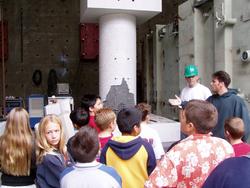UCSD Launches Residential Summer Academic Program
|
San Diego, CA, May 4, 2004 -- The University of California, San Diego has been named the fourth campus in the UC system to host the California State Summer School for Mathematics and Science (COSMOS), a four-week residential academic experience for top high school students. COSMOS at UCSD is administered through the Jacobs School of Engineering and will place a strong emphasis on technology and engineering, in addition to mathematics and science.
Beginning in the summer of 2005, approximately 80 students will be selected to participate in the program at UCSD, which will offer intensive classroom, laboratory and design experience in topics such as computer visualization, earthquake engineering, tissue engineering, plant genetics, and prescription drug discovery.
California’s former First Lady Gayle Wilson who chairs the COSMOS Statewide Advisory Board said: “As a former San Diegan, I am delighted that the newest COSMOS site will open at the UCSD Jacobs School of Engineering. Having served on the COSMOS Statewide Advisory Board for four years, first as a member and now as Chair, I see COSMOS as an exciting opportunity to create and support a new community of young science and math scholars across California. COSMOS encourages students’ pursuit of a four-year university education and nurtures their continued interest in math or science graduate work and careers. Their creativity and passion is enhanced by this one-month immersion in college level courses and superb teaching and mentoring.”
COSMOS is currently offered at UC Irvine, UC Davis and UC Santa Cruz. With close to 1,000 qualified students applying for 450 openings statewide in summer 2004, the COSMOS Statewide Advisory Board members responded to a need to expand the program to a fourth campus in southern California.
The UCSD program will be supported initially by private contributions and fees paid by student participants who have the ability to pay. A generous contribution of $400,000 from the Toyota USA Foundation was awarded to underwrite planning and the first year of operation. The Legler Benbough Foundation and the California Institute for Telecommunications and Information Technology Calit² have pledged additional first year operating funds. San Diego area corporate and private citizens who wish to contribute tax-deductible support for the new program will be gratefully acknowledged.
According to Frieder Seible, Dean of the Jacobs School: “Our goal is to give these outstanding young people a glimpse of university life, cultivate their interests in engineering, math and science; and hopefully teach them something new and even life-changing along the way.” Calit² and the San Diego Supercomputer Center are creating a joint course cluster, which will give students the opportunity to prototype real-world networking infrastructure in "living laboratories." UCSD’s Divisions of Biological and Physical Sciences and the Scripps Institution of Oceanography are also developing course clusters for the program.
“UCSD is known for its dedication to community-focused, K-12 outreach and enrichment programs in the areas of engineering and science,” said Gabriele Wienhausen, co-director of COSMOS at UCSD and UCSD Sixth College Provost. “COSMOS is a natural progression in this already well-established history. As part of the university’s continual efforts to champion diversity, we plan to make a concerted effort to market the program to a broad demographic group.”
During the COSMOS application process, students apply to one campus and indicate their preferred course clusters. Final selections and course cluster assignments are made based on a number of accomplishments, including grade point average, teacher recommendations, students’ personal statements, and evidence of involvement in science or math extra curricular activities.
In its first year, UCSD will welcome 80 participants and will reach a target of 150 students per year by 2007. During the program, the 9th-12th grader participants will interact with faculty, high school teacher fellows, and graduate students; attend lectures and labs; and create a final project to be presented at the conclusion of the residential experience. Evenings and weekends will consist of organized social activities and field trips to San Diego attractions. Financial assistance to participate is provided to students with documented need. Approximately 37 percent of current California resident participants receive full financial aid and fee waiver.
Students may apply to COSMOS between January 15 and March 15, 2005 for the UCSD program scheduled for July 10 through August 6, 2005. Dates for COSMOS 2005 summer sessions at UC Davis, UC Irvine, and UC Santa Cruz will be announced later.
# # #
About COSMOS
The California State Summer School for Mathematics and Science (COSMOS) is a one-month summer residential academic experience for top high school students in mathematics and science. The COSMOS course clusters address topics not traditionally taught in high schools such as astronomy, aerospace engineering, biomedical sciences, computer science, wetlands ecology, ocean science, robotics, game theory, and more. Approximately 1,500 high school students have participated in COSMOS since it was launched in 2000. Among the COSMOS alumni who have reached college age, many are now enrolled at four-year institutions, including University of California campuses. http://www.ucop.edu/cosmos/
# # #
For a related story about the “Teams In Engineering Service” (TIES) program, go to http://www.calit2.net/research/labs/features/5-3-04_ties.html
Denine Hagen, Jacobs School of Engineering -- 858-534-2920, dhagen@ucsd.edu
Hanan Eisenman, UCOP -- 510-987-6194, hanan.eisenman@ucop.edu

